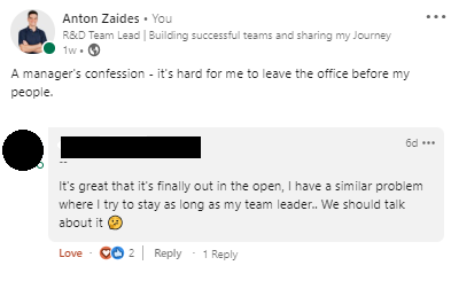The 3 Methods That Will Finally Get You Real Feedback from Your Developers
Struggling to get real feedback from your developers? Use these 3 proven techniques to dig deeper, build trust, and improve as an engineering manager.
Most bad managers know they’re bad.
Good managers? Their biggest problems are invisible - until it’s too late.
I recently spoke with 30 engineering team leads. I asked one simple question:
"What would your developers say you need to improve?"
Almost no one had a clear answer.
Why? Because getting honest feedback from your team is hard. And the usual methods don’t work.
It’s the same scene every performance review:
You ask for feedback at the end.
They smile. They say everything’s great.
And that’s it.
There is always something to improve. Small annoyances can turn into real blind spots. If you wait until people leave to find out what they were, it’s too late.
Here are 3 methods I’ve used to get the most valuable feedback of my career:
- Try different angles
- Share your own difficulties
- Make it about a specific situation
1. Try Different Angles
The classic "What can I improve?" rarely works. If you stop there, you’re missing gold.
Here’s what changed it for me - a conversation I had before switching roles:
Anton: “Before we finish, I’d love to get some feedback. Anything I could’ve done better?”
Anna: “Hmm... Honestly? I really enjoyed working with you. Can’t think of anything.”
(Side note: if you say “get back to me later” - they won’t.)
Anton: “Thank you! But I’m sure there’s something. Maybe something about my behavior, or how the team worked together?”
Anna: “No really, everything felt good!”
(Don’t stop here.)
Anton: “OK, let’s narrow it down. Do you feel I supported your growth? Were our 1:1s effective? Did you get clear feedback?”
Anna: “Now that you say that… I didn’t love how you gave feedback. You always saved it for the end of our 1:1s - after small talk, personal stuff, progress updates. So I started just waiting for the 'real' part. I didn’t want to share as much anymore. I would’ve preferred a separate meeting just for feedback.”
That BLEW MY MIND.
It was the first time I realized I was stuck in what Kim Scott calls Ruinous Empathy in Radical Candor - being too soft, too late.
This feedback changed how I run 1:1s to this day.
2. Share Your Own Difficulties
Recently, I posted about a leadership struggle on LinkedIn. One of my developers replied.
And that reply hit deep.

It made me think: Why is this conversation happening publicly, not between us?
If I want honest feedback from my team, why are they more comfortable giving it on a social network?
Brené Brown talks about this in Dare to Lead:
When you open up about your own challenges, people feel safer doing the same.
It’s not about being perfect - it’s about being human.
3. Make It About a Specific Situation
Sometimes the problem isn’t you - it’s that feedback feels too personal.
Instead of asking “What do you think of me?”, ask about a shared moment.
Here’s how it worked for me:
We had just finished a big project under tight deadlines. I asked a developer (Tom) how it went:
Anton: “What are your thoughts on Project X? Anything I could’ve done better?”
Tom: “Deadline was too short. We worked hard, but this won’t work long term. That said, I really enjoyed the work.”
Anton: “Yeah, agreed. I’ll push for better timelines. What else could I have done differently?”
Tom: “Hmm... Not much. It was solid.”
Anton: “Let’s say we had the same project, same timeline. What would you change in how we did it?”
Tom: “You know… I feel like we always sacrifice quality. CRs get approved too fast. We’ve gotten used to bugs creeping in. Even when we’re not under pressure, the habit stays.”
I had no idea he felt that way.
It helped me realize my tendency to skim CRs was sending a message - and that I needed others to help balance that out.
Summary
If you want real feedback, don’t just ask the default question and walk away.
Dig deeper.
Use these 3 methods:
- Try different angles - reframe the question, narrow the focus
- Share your own struggles - model the vulnerability you want to receive
- Make it about the situation - not about “you,” but about shared experience
These conversations won’t always be easy — but they’ll make you a much better manager.
FAQ: Getting Real Feedback from Developers
Q: What if they really have no feedback?
They do - but you’re probably asking the wrong way. Reframe the question, shift the context, or make it specific to a situation.
Q: How often should I ask for feedback?
At least once a quarter. And ideally during natural breakpoints - post-project, role changes, 1:1s after a tough sprint.
Q: Should I ask in writing or in person?
Start in person. Writing feels too formal or risky. Once there's trust, async feedback can work too.
Q: What if I don’t like what I hear?
That’s good. Discomfort means you’re learning. Take it in, thank them, and use it to grow.
Q: How do I make them feel safe to give honest feedback?
Start by sharing something you struggle with. Then ask for their take. Model the behavior first.